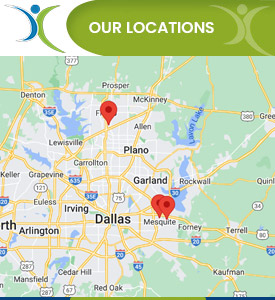How Do You Know When Back Pain Is Serious?
Back pain can occur when mechanical or structural issues emerge in the spine, discs, muscles, ligaments, or tendons, or when a nerve is compressed. Back pain is fairly frequent and usually has no major cause. Muscle strain, disk degeneration, and various medical problems, such as scoliosis and osteoporosis, are common causes of back pain. Learn about treatments, physical activity, and other techniques for coping with back pain from Dr. Andrew H. Morchower, M.D., M.P.H. at OmniSpine Pain Management. For more information, contact us or book an appointment online. Our clinics are located in Frisco, TX, Sunnyvale, TX, and Mesquite, TX.




Table of Contents:
How do you know if back pain is serious?
When should you not ignore back pain?
What symptoms associated with back pain should prompt you to see a doctor?
What is the most common diagnosis of back pain?
Back pain is a common complaint that affects many people at some point in their lives. While most cases of back pain are not serious and can be managed with self-care measures, there are times when it could be an indication of a more serious underlying condition.
It’s important to pay attention to the symptoms that accompany the back pain to determine if it requires medical attention. If the back pain is accompanied by fever, loss of bladder or bowel control, weakness, numbness, tingling, or severe pain that doesn’t go away with rest, then it could be an indication of a serious issue.
Some of the serious underlying conditions that could cause back pain include spinal stenosis, herniated discs, osteoporosis, spinal cord injury, or cancer. These conditions require quick medical attention to prevent further damage and complications.
If you experience any of these symptoms, it’s best to seek medical attention as soon as possible. You will probably undergo a physical exam and do some testing to determine the cause of the back pain and recommend an appropriate treatment plan.
It’s important not to ignore back pain, especially if it’s accompanied by other symptoms. If you experience back pain along with unexplained weight loss, fever, chills, or night sweats, it could be a sign of a more serious underlying condition such as infection, tumor, or autoimmune disorder. If you’re experiencing any of these conditions, it’s important to seek medical attention as soon as possible.
Similarly, if the back pain is severe and doesn’t go away with rest or over-the-counter pain medications, or if you have numbness, weakness, or tingling in the legs, which could be signs of a herniated disc or spinal stenosis.
It’s also important not to ignore back pain if you have a history of cancer, osteoporosis, or any other bone-related disease, as these conditions can weaken the bones and a greater risk of fractures.
In summary, it’s important not to ignore back pain if it’s accompanied by other symptoms or if it’s severe and doesn’t go away with self-care measures. Seeking prompt medical attention can help identify the underlying cause of the pain and prevent further complications.
If you experience back pain along with any of the following symptoms, it’s important to seek medical attention as soon as possible:
1. Fever: If you have a fever along with back pain, it could be a sign of an infection or other serious condition.
2. Loss of bladder and/or bowel control: sudden loss of bladder or bowel control along with back pain, could be a sign of spinal cord compression or other serious condition that requires immediate medical attention.
3. Numbness or weakness: If you experience numbness or weakness in the legs or feet along with back pain, it could be a sign of nerve damage or a herniated disc.
4. Unexplained weight loss: If you have back pain along with unexplained weight loss, it could be a sign of a more serious underlying condition such as cancer.
5. Severe pain that doesn’t go away with rest: If you have severe back pain that doesn’t go away with rest or over-the-counter pain suppressants, could be a serious condition that needs some medical attention.
6. History of cancer: If you have a history of cancer and experience back pain, it’s important to seek medical attention as soon as possible to rule out the possibility of cancer spreading to the bones.
The most common diagnosis of back pain is “non-specific low back pain,” which means that the exact cause of the pain is undetermined. This type of back pain is usually caused by muscle strain or sprain from poor posture, lifting heavy objects, or sudden movements.
While non-specific low back pain is not a serious condition, it can cause discomfort, and pain and affect daily activities. The good news is that it can be managed with at-home measures such as rest, ice or heat therapy, over-the-counter pain medications, and gentle exercises.
Other causes of back pain include sciatica, herniated disc, spinal stenosis, osteoporosis, and fibromyalgia. These conditions require a proper diagnosis and treatment plan by a healthcare professional.
Do you suffer from persistent back pain? Visit Dr. Andrew H. Morchower, M.D., M.P.H., at OmniSpine Pain Management to get the appropriate diagnosis and treatment to get immediate relief from pain. For more information, contact us or book an appointment online. Our clinics are located in Frisco, TX, Sunnyvale, TX, and Mesquite, TX. We serve patients from Dallas TX, Frisco TX, Mesquite TX, Sunnyvale TX, Plano TX, Garland TX, Forney TX, Cedar Hill TX, Denton TX, Balch Springs TX, and surrounding areas.
Check Out Our 5 Star Reviews






